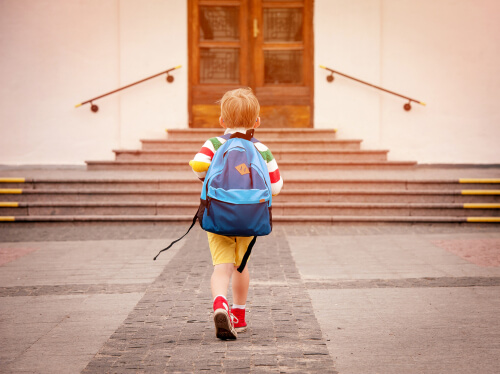
Table of contents
- How do you make the transition as smooth as possible?
- Get into a routine
- Socialise with other children
- Understanding the role of teacher
- Toilet training
- Do they recognise their own name?
- Give uniforms a trial run
- Do they know how to tie shoelaces?
- Preparing for school by practising the ‘goodbye’
- Make your own plans
- Talk it over!
Table of contents
- How do you make the transition as smooth as possible?
- Get into a routine
- Socialise with other children
- Understanding the role of teacher
- Toilet training
- Do they recognise their own name?
- Give uniforms a trial run
- Do they know how to tie shoelaces?
- Preparing for school by practising the ‘goodbye’
- Make your own plans
- Talk it over!
It is important to prepare your child for starting school. It can be an exciting but also a nerve-wracking time for both children and parents.
You’re probably ready to get the uniform laid out, the lunch box ready and the book bag packed. But have you thought about how to prepare your child for their first experience of school life?
How do you make the transition as smooth as possible?
Whilst none of these steps are essential to your child being a successful school-goer, there are a few things that parents can do to help prepare them for their first few weeks at school and make the transition as smooth as possible.
Here are 10 simple tips and activities to help prepare your child for school.
Get into a routine
Adjusting to the school day routine is perhaps the most difficult transition for children. Getting up at the same time each day, putting on a uniform and being ready and punctual for a learning day is not always an easy task for children.
It would be beneficial to start preparing your child for the general routine of school, weeks or even months before they are due to start. You might consider:
- Set a specific bedtime and wake up time to match your intended school day routine.
- Encourage children to get dressed, eat breakfast, and brush their teeth in the morning before they can play or watch tv.
- Get everyone ready and in the car for a specific time. You could go and visit a relative or friend so it’s not a wasted effort.
Socialise with other children
If your child has been attending nursery, or even if they have siblings, they are probably well versed already with the etiquette of social interactions. Still, it may be worth spending extra time with them before they start school to remind them of positive behaviours.
This will help them to adjust to being around a bigger group of other children. It will also minimise the chances of any big breakdowns.
Good skills to learn include:
- Listening to others
- Sharing and playing nicely
- Positive communication
- Respect for others
Understanding the role of teacher
For many children, the only authoritative role they know will be their parents. Getting used to taking direction from a person who will essentially be a stranger for a little while may be a challenge.
Consider reading books with your child about school to help them understand what a teacher does and what their role is in the classroom. It may help them understand how they themselves are expected to behave.
Many schools also offer taster days where children can meet their teacher and other children in their class. This can be really beneficial.
Toilet training
Potty training is a big step for all children. It is also a great indicator that they are ready to take on school life. Spend time with your child teaching them about how to wipe, flush the toilet and wash their hands. This helps them embrace their independence during the school day.
Ideally, your child should be nappy free during the day before they start school. But if they are still having accidents, let their teacher know and be sure to pack a spare pair of underwear!
Read our article for more information about potty training.
Do they recognise their own name?
Children will most likely know their name when you call it, but would they recognise it when it’s written down?
If you can, try to teach your child how to write their own name, but if not, they should be able to read their name so they can identify their belongings; school jumpers, book bags, etc., and recognise when the teacher is addressing them.
Give uniforms a trial run
How often have you picked out a cute outfit for your child to wear, but it turns out to be one of those days where they leave the house with their hand-picked, wonderfully mismatched ensemble? When raising a child, outfit choices are often one of those battles that aren’t worth fighting, which can make it difficult to convince them to put on the same uniform day after day.

Try to give them a few opportunities to try on their uniforms in the run up to the big day. This will give them a chance to get used to wearing it, and will also allow you to find out if there are any niggly bits that might cause a problem on school mornings, itchy labels or shoes that don’t fit right, for example.
Do they know how to tie shoelaces?
This may seem a small feat when thinking about everything you have to organise before that long awaited first day, but teaching your child how to tie their own shoelaces will help the day run much smoother for them and their teachers.
There will be an abundance of play time, P.E lessons, etc. where laces may come undone, or children need to get changed. Being able to tie their own shoelaces will give your child a sense of independence and reduce the things they need to ask for help with.
Preparing for school by practising the ‘goodbye’
This may sound dramatic, but many children won’t actually put together the idea that going to school means that you won’t be there with them and this can lead to some emotional moments at the school gate.
If your child has been going to nursery, they may be more accustomed to this but even then, school and nursery are very different settings and your child may need some support before they are ready to wave you off for the day.
The best way to get your child used to the idea that you’ll be leaving them at school is to talk to them about it. Talk them through the process. Remind them that you’ll be there at the end of the day to collect them.
When the day comes, try to stay as strong as you can. It can be an emotional time. But if your child sees you upset they’re likely to think that this is a sad time for the both of you. Even if you’re not feeling it, put on your biggest smile. Hopefully they’ll skip off into their new school without a look back.
Make your own plans
This step is technically about better preparing yourself for that first day. A prepared parent makes for a happy child!
For you, the first day your child goes off to school is probably going to be a mix of emotions. You’ll be nervous thinking about how they’re getting on. You’ll be proud to see them in their new uniforms and excited about picking them up at the end of the day. But have you thought about the in between bits too?
You’re suddenly going to have a lot more time to fill with something other than rushing around after your child. If you are already back to work or are planning to go back, try your best to schedule it to fit around the school day.
You may not be working and if so, try to fill your day with things you want to do. If you’re able to afford it, think about going shopping for the day or booking a haircut. Alternatively, you could arrange to meet up with friends for a walk or go and visit a relative.
Think about how you’d like to spend your time once your new routine is in full swing. This is particularly for those first few days when you’re feeling a little on edge.
Talk it over!
Help your child to understand that as they enter their new school, every day will not be perfect. Communicate openly with them. Let them know that some days may be scary or intimidating and it is fine for them to feel this way.
This also applies to you as a parent too. Feeling anxious about sending your child to school is completely normal and a shared experience for most parents.
Try to remember that this a new adventure for the both of you. Once the settling in period is over, you’ll look forward to hearing all about the things they’re getting up to.


